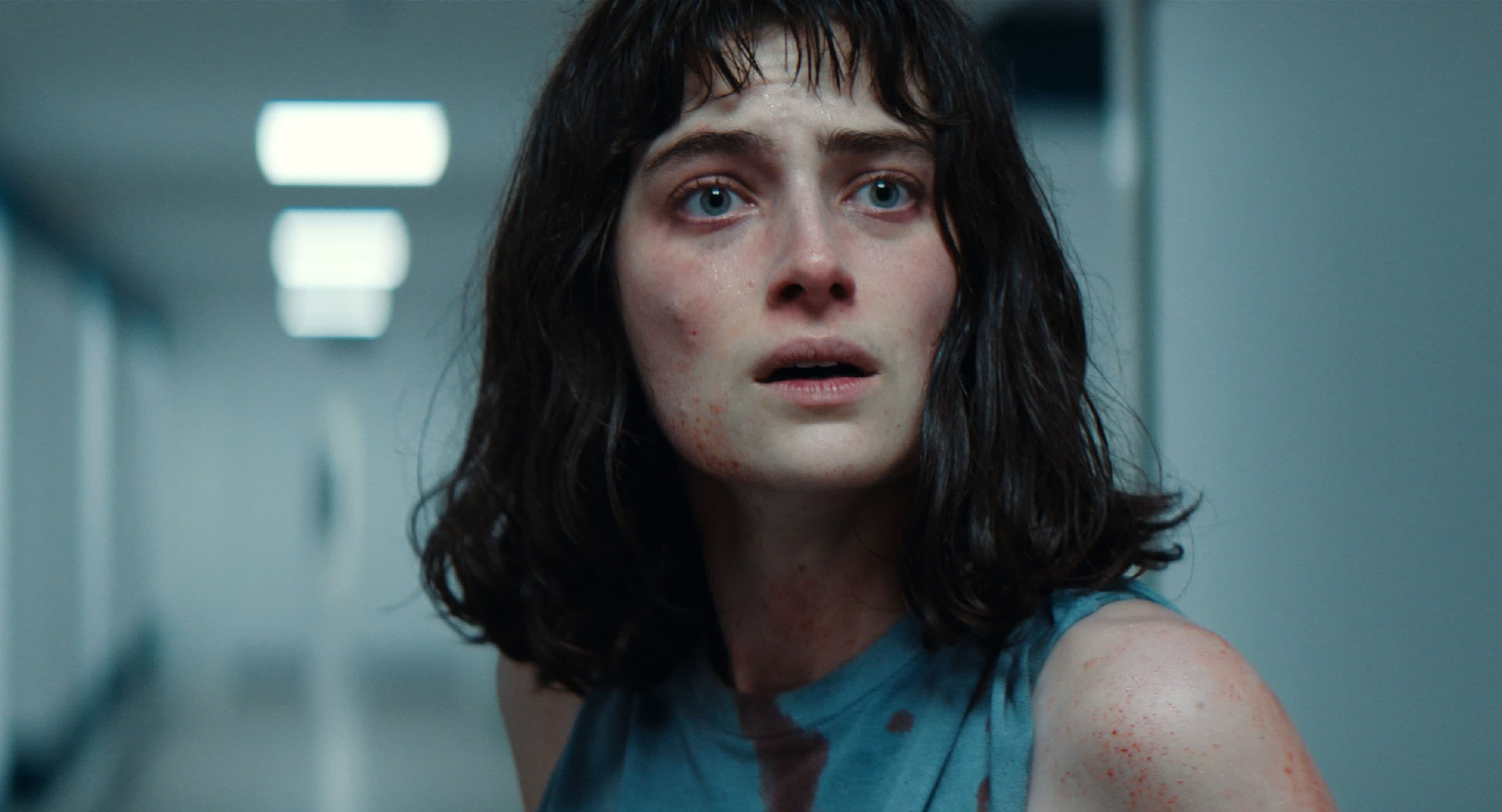Double Blind – Film Review
Published February 16, 2024

Double Blind, directed by Ian Hunt Duffy and written by Darach McGarrigle, emerges into the crowded field of horror with a tantalizing premise that mingles scientific hubris with the primal fear of sleep, something both unavoidable and ordinarily restorative. Starring Millie Brady, Pollyanna McIntosh, Akshay Kumar, Diarmuid Noyes, and Brenock O’Connor, the film endeavors to intertwine the psychological with the physiological in a narrative that could easily stand as a metaphor for our relentless, often self-destructive pursuit of progress. However, despite its intriguing setup and capable cast, Double Blind sometimes stumbles, leaving a few too many doors closed in exploring its narrative potential.
At its heart, the film deals with an experimental drug trial gone horrifically wrong. The premise alone is chilling and immediate; sleep, the sanctuary of the weary, becomes a death sentence. Trapped in an isolated facility, the test subjects, and their monitors, including Claire (Millie Brady), Dr. Burke (Pollyanna McIntosh), Amir (Akshay Kumar), Ray (Diarmuid Noyes), and Paul (Brenock O’Connor), embark on a desperate quest for survival. Their challenge: to escape and remain awake, a task easier said than done.
The film’s early acts skillfully build tension, capitalizing on the claustrophobic setting and the psychological unraveling of characters as sleep deprivation takes its toll. Millie Brady delivers a standout performance as Claire, effectively conveying the mounting fear and desperation of her situation. Pollyanna McIntosh’s Dr. Burke offers a coldly scientific counterpoint, embodying the ethical ambiguities at the heart of the experiment gone awry. Together, the cast manages to convey the increasing hysteria without descending into caricature, a testament to their skills and Duffy’s direction.
The cinematography deserves special mention. The use of light and shadow inside the facility amplifies the creeping dread, making the surroundings almost another character in the film. The isolation is palpable, the sense of entrapment visceral. It’s in these visual elements that Double Blind most effectively communicates its horror.
The premise’s promise, however, is not fully realized. The central conceit – that sleep brings death – is a goldmine of psychological horror, yet the script doesn’t delve as deeply into this as it could. The film sometimes prioritizes jump scares over the more profound terror of the body turning against itself, missing opportunities to explore the deeper existential dread that the scenario offers. While the performances are strong, the characters sometimes feel underdeveloped, particularly the supporting cast. Amir, Ray, and Paul, despite being portrayed by capable actors, are given limited backstory or development, making it harder for the audience to connect with their plight on a deeper level.
Furthermore, Double Blind grapples with pacing issues. After a strong start, the middle section of the film drags, with repetitive scenes that contribute little to character development or plot advancement. The suspense built up early on is somewhat dissipated by these lulls, though the final act manages to recapture some of the initial momentum.
The resolution of the film is another mixed bag. On one hand, it offers a satisfying twist that few will see coming, serving as a testament to the creativity behind the project. On the other, the conclusion feels somewhat rushed, leaving several narrative threads hanging. Questions about the nature of the drug trial, the motivations of its overseers, and the ultimate fate of the facility and its experiments are left inadequately addressed. It’s as though the film, so rich in potential, takes a safer route towards its conclusion, rather than fully embracing the complexity of its setup.
Double Blind operates on a premise ripe with terror and potential for profound commentary on human endurance, the boundaries of science, and the ethics of experimentation. At its best, it delivers tension, fear, and introspection, carried by strong performances and effective visual storytelling. Yet, it also leaves the audience wanting more – more depth, more development, and more exploration of its fascinating premise.
For fans of horror and psychological thrillers, Double Blind offers enough to satisfy a craving for suspense and fear. However, those looking for a deeper dive into the dark corners of the human psyche and the consequences of unchecked scientific ambition may find it a bit wanting. As it stands, Double Blind is a solid, if not groundbreaking, addition to the horror genre. Its brilliance is occasionally dimmed by its shortcomings, but it remains a testament to the potential of its premise and the talents of its cast and crew. In the end, Double Blind is worth watching, but it might not linger in your nightmares as long as its premise suggests it should.
